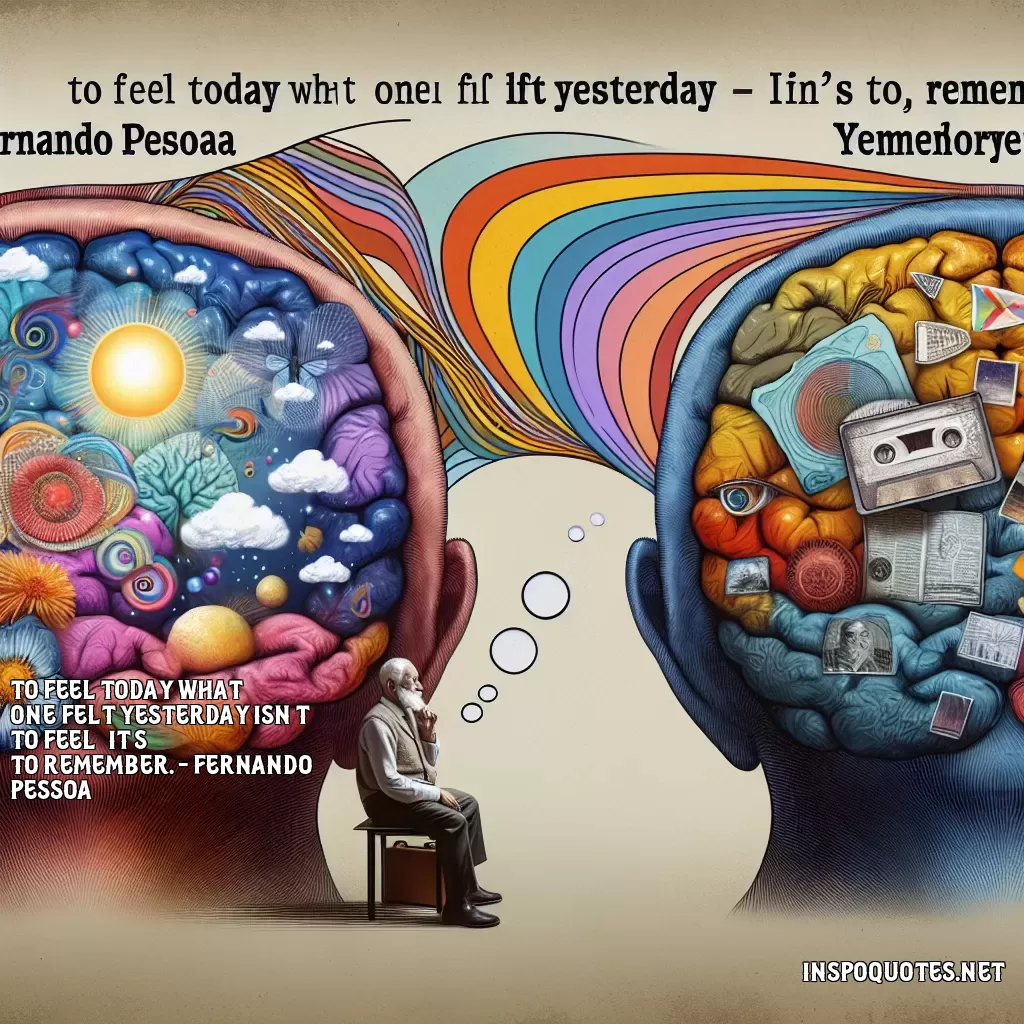
To feel today what one felt yesterday isn’t to feel it’s to remember. - Fernando Pessoa
Author: Fernando Pessoa
👁️ 22 views

To feel today what one felt yesterday isn’t to feel it’s to remember. - Fernando Pessoa
👁️ 22 views
The quote by Fernando Pessoa, "To feel today what one felt yesterday isn’t to feel – it’s to remember," delves into the nuanced distinction between genuine emotion and mere recollection. At its core, the quote underscores the dynamic nature of human emotions, emphasizing that true feeling is a fresh, immediate experience rather than a recycled one. When Pessoa states that feeling today what one felt yesterday isn't truly feeling, he suggests that authentic emotional experiences are rooted in the present moment. Feelings are spontaneous and responsive to the current context, environment, and state of being. They are raw, uncensored reactions to stimuli as they happen. When someone tries to replicate an emotion experienced in the past, without the presence of new catalysts, they fall into the realm of memory. Memory, on the other hand, is a cognitive process. It's an act of reflecting on something that is no longer present, distanced by time. When one 'recalls' an emotion, they are essentially replaying a past experience rather than engaging with the immediate. This act of remembering can be vivid and seemingly emotional, but it lacks the authenticity and immediacy of a true feeling. Pessoa's quote invites introspection about how we experience emotions. It challenges us to differentiate between the living pulse of present feeling and the echo of past emotions. By doing so, it encourages an authentic engagement with life, urging us to embrace the newness of each moment rather than resting on the familiarity of past experiences. In a broader sense, this distinction can enrich our understanding of self-awareness and emotional intelligence, prompting us to seek genuine connections with the present world around us.
Quote By: Fernando Pessoa
Fernando Pessoa: A Multifaceted Literary Genius
Fernando Pessoa, born on June 13, 1888, in Lisbon, Portugal, remains one of the most influential and enigmatic figures in 20th-century literature. Often celebrated for his profound and complex poetry, Pessoa was not just a poet but a literary innovator who crafted a unique approach to writing through the concept of heteronyms—distinct literary personas with their own biographies, writing styles, and philosophies.
Pessoa spent much of his formative years in South Africa, where he was exposed to English literature and culture. This multicultural upbringing significantly shaped his worldview and literary voice. Upon returning to Lisbon in 1905, Pessoa began to immerse himself in the city's vibrant literary scene. Although he published only a handful of works during his lifetime, he produced an impressive body of poetry, essays, and prose that would later be recognized as masterpieces of modernist literature.
One of the most remarkable aspects of Fernando Pessoa's work is his creation of numerous heteronyms, including Alberto Caeiro, Ricardo Reis, and Álvaro de Campos. Each heteronym represents a different facet of Pessoa’s imagination and intellectual exploration, allowing him to explore various philosophical and existential themes. For instance, Caeiro embodies a pastoral simplicity, while Campos reveals the tumult of modernity and futurism. Pessoa’s ability to inhabit these diverse identities showcases his deep understanding of the complexities of the human experience.
Despite his substantial contributions to literature, Pessoa remained relatively unknown during his lifetime, publishing under his own name primarily in the form of articles and reviews. It wasn’t until his death on November 30, 1935, that the full extent of his literary legacy was uncovered. His posthumously published works, particularly "The Book of Disquiet," have garnered widespread acclaim and solidified Fernando Pessoa's status as a titan of modernist literature.
Today, Fernando Pessoa is celebrated not only for his innovative poetic forms and philosophical inquiries but also for the rich tapestry of characters and voices that continue to resonate with readers around the world. His exploration of identity, consciousness, and the human condition remains profoundly relevant, ensuring that Pessoa’s literary genius endures in the landscape of world literature.